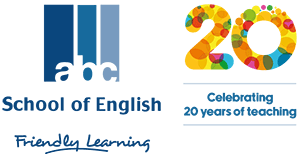Get Ready for IELTS!
By Rachel Abbott (ABC School’s Academic Coordinator)
The International English Language Testing System (IELTS) is a reliable way of assessing the English language ability of those who need to work or study in places where English is the language of communication. The IELTS exam assesses candidates’ language competence on a scale from 0-9.
The IELTS exam consists of four parts: Speaking, Listening, Reading and Writing.
There are two versions of the IELTS exam, Academic and General. The Academic format is, usually, for those who want to study in an English-speaking country within an Institution of Higher and Further Education. Admission into undergraduate and postgraduate courses is based on the results of the Academic test.
The General training format focuses on general survival skills within social and workplace situations and is usually for those who are going to English-speaking countries for secondary education or for work experience. This is the course we shall be offering from 26th September.

 Listening skills are essential to achieving a high band score in the IELTS exam and during your course your teacher will teach you these skills. Some of the listening skills you will cover are Predicting and Identifying keywords.
Predicting is not the same as guessing. We make predictions based on information we already have. In the IELTS listening section, you are given time to consider the type of information that could be the answer before listening to the recording. This helps you to focus on the information you’ll need to listen out for. You will learn how to identify key words in questions (usually nouns, verbs and adjectives) and be able to come up with synonyms (words of similar meaning) for these key words. Key words in the questions are not likely to be the exact words mentioned in the recording.
On your IELTS course, you will learn how to write essays and how to interpret and explain, in writing, information given on line graphs, pie charts, tables, maps and diagrams.
All of the skills and vocabulary you will learn on your course are extremely important for achieving a high band score but these skills are also useful for improving your score in any Cambridge English exam such as FCE and CAE.
Take a course with us and you can be confident that you will be taught by English specialists who will prepare you for one of the most important exams you will ever take in your life.
Listening skills are essential to achieving a high band score in the IELTS exam and during your course your teacher will teach you these skills. Some of the listening skills you will cover are Predicting and Identifying keywords.
Predicting is not the same as guessing. We make predictions based on information we already have. In the IELTS listening section, you are given time to consider the type of information that could be the answer before listening to the recording. This helps you to focus on the information you’ll need to listen out for. You will learn how to identify key words in questions (usually nouns, verbs and adjectives) and be able to come up with synonyms (words of similar meaning) for these key words. Key words in the questions are not likely to be the exact words mentioned in the recording.
On your IELTS course, you will learn how to write essays and how to interpret and explain, in writing, information given on line graphs, pie charts, tables, maps and diagrams.
All of the skills and vocabulary you will learn on your course are extremely important for achieving a high band score but these skills are also useful for improving your score in any Cambridge English exam such as FCE and CAE.
Take a course with us and you can be confident that you will be taught by English specialists who will prepare you for one of the most important exams you will ever take in your life.

Why study IELTS?
IELTS is the most widely accepted English language test around the world and is designed by experts in the field of English languag e assessment. More than 9,000 organisations worldwide accept IELTS as proof of language ability. You can be completely confident that IELTS will give a fair and consistent assessment of your English language skills and of your ability to communicate for work, study or life in an English-speaking country.
What will I study?
IELTS preparation courses offer exposure to actual IELTS tasks and are all taught by qualified and experienced IELTS teachers. On an IELTS course you will:- Learn tips and strategies to help you with each component of the exam.
- Be able to practise all parts of the exam and receive detailed feedback from your teacher.
- Become very familiar with the format of the exam and have timed practice of each exam component.
- Expand your vocabulary and improve your grammar.
- Make new friends with people from all around the world.
- Health
- Education
- People
- Crime
- Energy and Environment
- Media
- Work
 Listening skills are essential to achieving a high band score in the IELTS exam and during your course your teacher will teach you these skills. Some of the listening skills you will cover are Predicting and Identifying keywords.
Predicting is not the same as guessing. We make predictions based on information we already have. In the IELTS listening section, you are given time to consider the type of information that could be the answer before listening to the recording. This helps you to focus on the information you’ll need to listen out for. You will learn how to identify key words in questions (usually nouns, verbs and adjectives) and be able to come up with synonyms (words of similar meaning) for these key words. Key words in the questions are not likely to be the exact words mentioned in the recording.
On your IELTS course, you will learn how to write essays and how to interpret and explain, in writing, information given on line graphs, pie charts, tables, maps and diagrams.
All of the skills and vocabulary you will learn on your course are extremely important for achieving a high band score but these skills are also useful for improving your score in any Cambridge English exam such as FCE and CAE.
Take a course with us and you can be confident that you will be taught by English specialists who will prepare you for one of the most important exams you will ever take in your life.
Listening skills are essential to achieving a high band score in the IELTS exam and during your course your teacher will teach you these skills. Some of the listening skills you will cover are Predicting and Identifying keywords.
Predicting is not the same as guessing. We make predictions based on information we already have. In the IELTS listening section, you are given time to consider the type of information that could be the answer before listening to the recording. This helps you to focus on the information you’ll need to listen out for. You will learn how to identify key words in questions (usually nouns, verbs and adjectives) and be able to come up with synonyms (words of similar meaning) for these key words. Key words in the questions are not likely to be the exact words mentioned in the recording.
On your IELTS course, you will learn how to write essays and how to interpret and explain, in writing, information given on line graphs, pie charts, tables, maps and diagrams.
All of the skills and vocabulary you will learn on your course are extremely important for achieving a high band score but these skills are also useful for improving your score in any Cambridge English exam such as FCE and CAE.
Take a course with us and you can be confident that you will be taught by English specialists who will prepare you for one of the most important exams you will ever take in your life.














